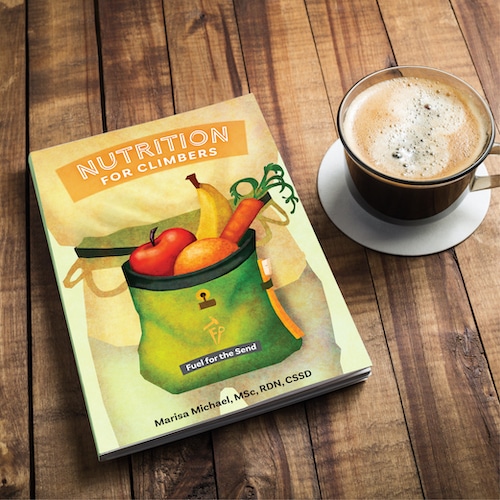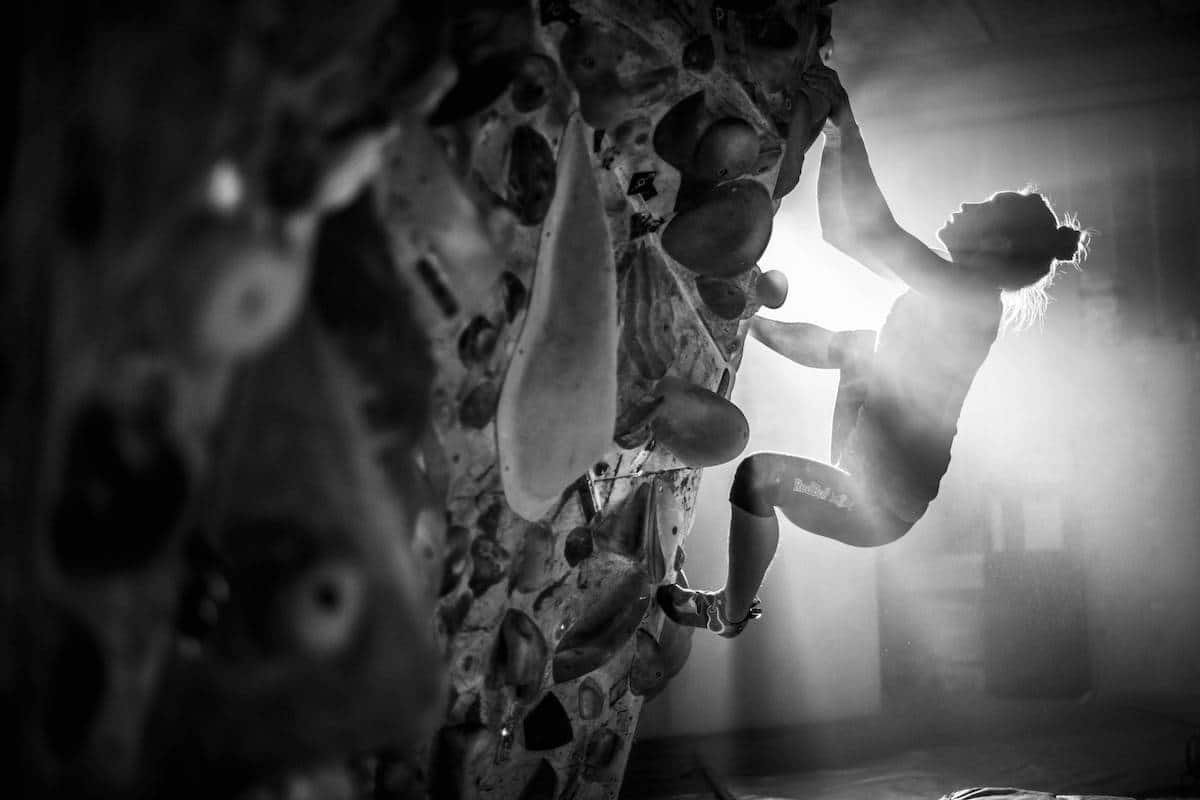When thinking about dieting or trying to lose weight in order to be a better climber, you don’t need to pick a diet that never lets you eat beans, potatoes, fruit, or anything else. Just eat real food.
In general, a diet based on vegetables, fruits, beans, nuts, seeds, lean proteins, and whole grains is about as healthy as you can get.
The key to losing weight happens in a calorie deficit. While again, specific diets have not been studied for climbing performance, I would guess based on research and clinical judgment that climbers on keto diets have decreased climbing performance. If they feel stronger with a keto diet, it may be because they lost a bit of weight, but not because they are in ketosis.
Dieting can also lead to hyper-awareness of food intake. Portion sizes, types of food, hunger levels, and more can become all-consuming if the diet isn’t carefully managed. This can lead to eating disorders or disordered eating patterns.
Two research studies looking at people who used MyFitnessPal (a calorie-tracking smartphone app) came to some disturbing conclusions. One showed that 38 percent of males using MyFitnessPal felt that their use of the app led to disordered eating. Another showed that college students who had a higher level of dietary restraint and fitness tracking were associated with eating disorder symptoms. If tracking your calories and exercise makes you anxious or more restrained or feel guilt or shame, or a general feeling of being out of control, it’s time to stop using the app.
Let’s look at one popular diet fad right now and debunk what this plan is and promises.
What is Whole 30?
Whole30 is a popular diet plan claiming to help with gut health, hormone balance, inflammation, energy levels, and more. You can read all sorts of glowing testimonials about how this diet changed people’s lives. Does it warrant your attention? Let’s take a closer look to see if it is a legitimate source of information.
Who wrote it?
Melissa Hartwig, a Certified Sports Nutritionist through the International Society of Sports Nutrition. This certification can be obtained online and doesn’t require a four-year degree in anything related to nutrition, biology, or other health sciences. This isn’t a robust qualification. Hartwig’s degree comes from an online, unaccredited program; she lacks understanding and education in basic physiology, biochemistry, nutrition, and biology.
Dallas Hartwig, the co-author, actually has some good credentials, with an undergrad in anatomy and physiology (but not nutrition). It all falls apart when you realize Dallas has a sketchy certification in “functional medicine” (often described as an approach to treating a patient by looking at the whole body, and environmental and lifestyle factors around a person–still not nutrition).
What is the tone?
The Whole30 website claims it can improve or cure a myriad of diseases and ailments, including Crohn’s disease, type 1 and type 2 diabetes, arthritis, infertility, and more. It is extreme in its language and lacks nuance. It evokes strong emotions like extreme hope (“If I follow this, I can cure my diabetes”) or guilt (“I ate a forbidden food”). Words like “good,” “bad,” “toxic,” “clean,” “miracle,” and “life-changing” are big red flags. It claims, “One bite of pizza, one spoonful of ice cream, one lick of the spoon mixing the batter within the 30-day period and you’ve broken the ‘reset’ button, requiring you to start over again on Day 1.”
OK, let’s just think about this on a physiological basis. Your body doesn’t have a reset button. If you eat a spoonful of ice cream, your body just digests and metabolizes it as carbohydrate, protein, and fat (a very small amount, I might add). Your body doesn’t know the difference between ice cream and any other food with a similar nutrient profile. It just sees the molecules and digests accordingly. To posit that if you eat one bite of pizza, your body will react in an extreme way is nonsense. Unless you are truly allergic to a food, one bite of anything is no big deal.
Is it well-referenced?
Nope. Not at all. There is a lack of peer-reviewed articles. The claims made about nutrition and health are not backed up by science.
Does the author agree with the general nutrition field?
Um, no.
Hartwig goes off the deep end, with fantastical and wild claims about how Whole30 can help with all sorts of ailments. The book states things with black-and-white certainty, while the remainder of the nutrition science field expresses caution, nuance, and “more research is needed” on a variety of issues.
Does the author have a conflict of interest?
Yes. She has incentive to continue with her inaccurate claims, because sensation is what sells. The Whole30 website also has numerous links to various foods available for purchase, including bars, meal kits, nut butters, bone broth, and more.
Does the author recognize limitations to the research?
No, because there isn’t any mention of research to begin with. A hallmark of quality nutrition information is presenting the limitations to the research and recognizing the nuance in the recommendations, as well as analyzing if the research study was well-designed and can be considered valid.
Does the diet or recommendation require you to give up entire food groups or drastically change your life?
Yes, yes, yes, yes!
Whole30 eliminates healthful foods like beans, grains, and dairy. It calls for drastic changes in lifestyle. It lacks compassion and is judgmental. It carries the tone of, “If you can’t follow this diet, you are weak.” The fact that this diet is only in place for 30 days means it is not intended to be a permanent, sustainable lifestyle change. The diet calls for re-introduction of other foods after 30 days, which could prove troublesome if your body has downregulated its ability to digest those foods you just eliminated for 30 days.
Does the nutrition information rely on anecdotes and testimonials?
Oh, my, yes. This is basically all it is. There is no way to know if these are true. There is no way to know if these people were paid to write the testimonials. There is no way to determine if these people merely felt better (whatever that means) from the placebo effect. Robust science is lacking on all fronts. Even the testimonials from health professionals on the website are lacking in critical thinking.
Does it contain buzzwords and fads?
This is basically all it contains. Here are some buzzwords I picked up from their website:
- Miracle
- Gut-damaging
- Inflammation
- Cravings
- Whole
- Clean
- Sugar
- Approved
- Toxic
- Cheat
- Incredible
- Forever
THE BOTTOM LINE:
Whole30 is not backed by science, basic biology, or anything else valid. It is a diet based on testimonials and conjecture. It recommends potentially dangerous nutrition interventions and sells false hope.
Start to become a critical thinker. Analyze any diet program with a cynical view. Tread carefully when making any diet changes. Be careful that you do not fall into disordered eating patterns. Don’t sell yourself short—make sure you fully understand diet changes, the reasoning and science behind them, and how they fit with your lifestyle, health history, needs, and goals.

This is an excerpt from “Nutrition for Climbers: Fuel for the Send” by Marisa Michael and published by Fixed Pin Publishing. Marisa Michael is a registered dietitian nutritionist specializing in sports nutrition. She owns a private practice, Real Nutrition, LLC, in Portland, Oregon, USA. Marisa helps athletes and active people achieve better health and performance through nutrition. Marisa has an undergraduate degree in Dietetics from Brigham Young University, and a master’s degree in sports nutrition from the University of Stirling. She is a certified personal trainer and group exercise instructor. She holds the International Olympic Committee’s Diploma in Sports Nutrition and is a Board Certified Specialist in Sports Dietetics. She firmly believes that relationships with food and body play a huge role in mental and physical health, and applies that in her own life by thoroughly enjoying ice cream and chocolate on a regular basis. Marisa is available for one-on-one consultations (virtual and in-person), workshops, speaking engagements, and writing for publications. You can book and appointment and find on-demand e-courses on her website at realnutritionllc.com.




I tried the Whole30 based on a glowing recommendation from a friend. Is it strict, yes. But I did it. I needed to reduce my sugar and alcohol intake and this helped. I lost weight and felt much better during and after the 30 days. I did not try this because I needed to cure anything. I am glad I found your article, I had no idea her “nutrition” degree was sketchy, thank you for clearing that up. Bottom line I felt better. I believe if someone wants to try this they should, I just wouldn’t want someone doing it thinking they are going to cure anything. I’d be interested in your book, but, I am not a climber. Again, thanks for this article.
Thank you for your critique of the Whole30.
I read Food Freedom Forever, Melissa Hartwig’s other book. Whilst prepping for a natural bodybuilding comp, as a personal experiment I did the full elimination under strict medical and master personal trainer and nutritionist supervision. I had bloods done, DEXA and scale weight plus skin folds weekly. I had incredible success on the elimination component of the diet, lost 6-7kgs and down to 13% Bf. During the re-introdution I learned about foods that I ‘may’ be slightly intolerant of, no allergies, nothing that would kill me. I learned what gave me rashes/breakouts, made me lethargic etc.
During stage 2, where you practice ‘food freedom’ is where I came undone. At the crux it’s basically having an awareness of what you put in your body, without guilt or morality. However, if you fall off the wagon you’re supposed to do a reset (elimination) again, anywhere from 10-30 days. I never managed to make ‘resetting’ a tangible habit.
Thank you, you’ve saved me from doing another ‘unnecessary’ elimination diet I’m so glad you have credentials to point out the flaws in this methodology. By the way, the weightloss from the elimination occurred purely due to extreame calorie deficit – I didn’t have the energy to make my lifts when training!
P.S. I would love to hear more of your thoughts of how to healthily maintain one’s weight.